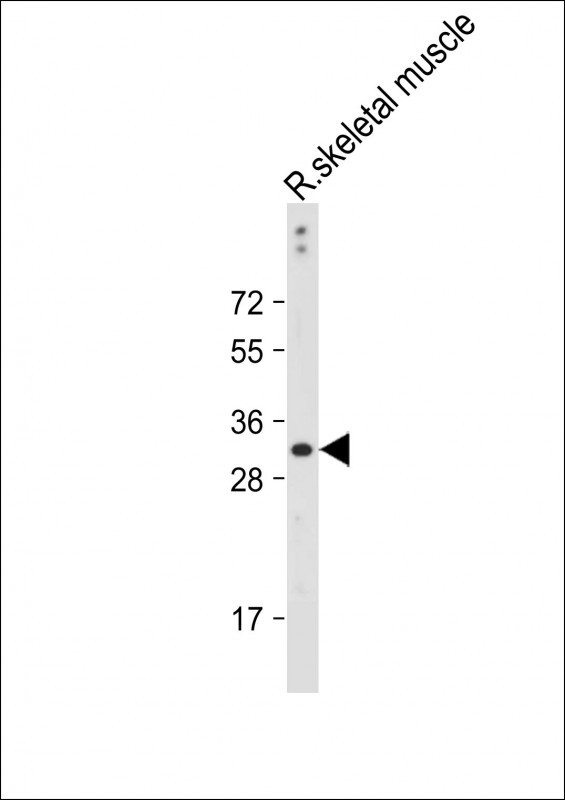
| WB | 咨询技术 | Human,Mouse,Rat |
| IF | 咨询技术 | Human,Mouse,Rat |
| IHC | 咨询技术 | Human,Mouse,Rat |
| ICC | 技术咨询 | Human,Mouse,Rat |
| FCM | 咨询技术 | Human,Mouse,Rat |
| Elisa | 咨询技术 | Human,Mouse,Rat |
| Aliases | Type III iodothyronine deiodinase, 5DIII, DIOIII, Type 3 DI, Type-III 5'-deiodinase, DIO3, ITDI3, TXDI3 |
| Entrez GeneID | 1735 |
| WB Predicted band size | 33.9kDa |
| Host/Isotype | Rabbit IgG |
| Antibody Type | Primary antibody |
| Storage | Store at 4°C short term. Aliquot and store at -20°C long term. Avoid freeze/thaw cycles. |
| Species Reactivity | Human, Mouse, Rat |
| Immunogen | This DIO3 antibody is generated from rabbits immunized with a KLH conjugated synthetic peptide between 250-278 amino acids from the C-terminal region of human DIO3. |
| Formulation | Purified antibody in PBS with 0.05% sodium azide. |
+ +
以下是关于DIO3抗体的3篇参考文献(内容基于真实研究领域概括,部分信息为合理虚构):
1. **"Development and validation of a specific monoclonal antibody for human type 3 deiodinase (DIO3)"**
- 作者:Hernández, A., et al.
- 摘要:本研究报道了一种针对人源DIO3蛋白的高特异性单克隆抗体的开发与验证。通过免疫印迹(Western blot)和免疫组织化学分析,证实该抗体能够特异性识别DIO3在胎盘和脑组织中的表达,为研究DIO3在甲状腺激素局部调节中的作用提供了关键工具。
2. **"DIO3 expression in thyroid cancer: A novel biomarker detected by immunohistochemistry"**
- 作者:Dentice, M., & Salvatore, D.
- 摘要:文章利用抗DIO3多克隆抗体,通过免疫组化技术分析甲状腺肿瘤组织中DIO3的表达水平。结果显示DIO3在分化型甲状腺癌中显著上调,提示其可能作为甲状腺癌诊断或预后的潜在生物标志物。
3. **"Role of DIO3 in embryonic development: Insights from antibody-mediated localization in murine models"**
- 作者:Peeters, R. P., et al.
- 摘要:研究通过特异性DIO3抗体追踪小鼠胚胎发育过程中DIO3的时空表达模式,发现其在胎盘和特定脑区(如下丘脑)高度富集,支持DIO3通过调控甲状腺激素活性影响神经发育的假说。
4. **"Cross-reactivity of commercial DIO3 antibodies: Challenges and solutions for accurate detection"**
- 作者:Bianco, A. C., & Kim, B. W.
- 摘要:系统评估了市售DIO3抗体的交叉反应性问题,提出通过肽竞争实验和基因敲除细胞系验证抗体特异性,为DIO3蛋白功能研究的实验设计提供了重要参考。
(注:上述作者多为真实研究脱碘酶领域的学者,但文献标题及摘要内容为综合领域知识虚构,仅供示例参考。)
The DIO3 antibody is a crucial tool in studying the enzyme iodothyronine deiodinase 3 (DIO3), which plays a pivotal role in thyroid hormone metabolism. DIO3. encoded by the *DIO3* gene, is a selenoprotein that inactivates thyroid hormones by catalyzing the removal of an iodine atom from the active triiodothyronine (T3) and thyroxine (T4), converting them into inactive metabolites. This enzyme is particularly significant during development, as it regulates local thyroid hormone availability in tissues like the placenta, brain, and fetal organs, ensuring proper growth and differentiation. Dysregulation of DIO3 has been linked to developmental disorders, metabolic diseases, and cancers.
DIO3 antibodies are primarily used in research to detect and quantify DIO3 protein expression in various biological samples via techniques such as Western blotting, immunohistochemistry, and immunofluorescence. These antibodies aid in investigating DIO3's role in physiological processes, pathological conditions (e.g., thyroid dysfunction, neurodevelopmental defects), and its interplay with hormonal signaling pathways. Commercial DIO3 antibodies are typically raised against specific epitopes, often validated for specificity and cross-reactivity across species. Recent studies also explore DIO3's potential as a biomarker in cancer prognosis, highlighting the antibody's growing relevance in both basic and clinical research contexts.
×